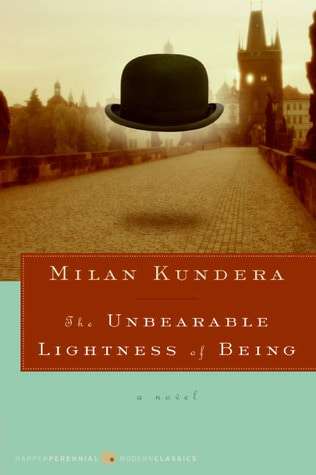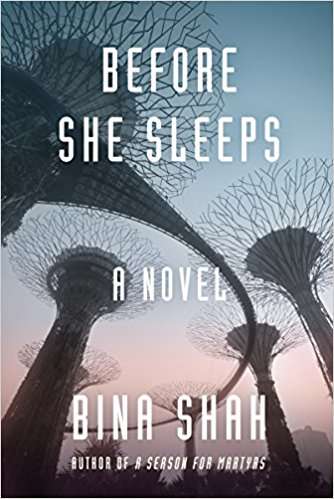Before She Sleeps
In Bina Shah‘s Before She Sleeps (Delphinium), the ratio of men to women in a South West Asia capital has become increasingly and critically low. In order to fix the problem, the government has taken on using modern technology, combined with terror, to ensure that women take on multiple husbands, to have as many children as fast as possible. But, there are those who resist: women who live underground, refusing to participate in this society, and are protected by the most elite members of society. Coming out secretly at night, these women provide the elite with the only commodity they can’t buy: intimacy and closeness without sex. But time moves on, and there’s nothing to say that those in power will be able to protect them forever.
Shah is a critically acclaimed author and journalist, writing for the International New York Times, Huffington Post, and The Guardian, as well as Dawn, a Pakistani newspaper where she covers Arts and Culture. A graduate of Harvard’s School of Education, and an alum of the International Writing Program at the University of Iowa, Shah has published three books, which have been translated into multiple languages and have won several prestigious awards. Before She Sleeps, will be published on August 7th, and is already being lauded as one of the most timely and relevant books of 2018.
Shah talked with us about writing Before She Sleeps, the differences in feminism of the East and West, and more.
BookTrib: This is such an interesting book, especially considering the modern political climate. What first made you want to write this book?
Bina Shah: Twenty years of life in Pakistan, witnessing and writing about some of the excesses committed on women because of a combination of religion, society and culture, made me want to express outrage and anger at this situation in a more artistic way than through the medium of journalism. Writing has always been an attempt to make sense of the world around me, but I’m afraid nothing about the poor treatment of women makes any sense to me. This book is a result of that need to express without being able to solve any problems.
BookTrib: The dystopian premise that you’ve created is inventive and unique – the concept of sleep as the commodity, rather than sex. How did this idea first come to you?
BS: Sleep encompasses not just the physical act of sleep, but the act of resting together, spending intimate time together, heads resting together on a pillow. That can be a greater intimacy than sex itself.  There is a great quote by Milan Kundera that prefaces The Unbearable Lightness of Being: “Making love with a woman and sleeping with a woman are two separate passions, not merely different but opposite. Love does not make itself felt in the desire for copulation (a desire that extends to an infinite number of women) but in the desire for shared sleep (a desire limited to one woman).” I came across this quote long after I’d finished writing Before She Sleeps (and I’d read The Unbearable Lightness of Being years ago), and when I found it, I thought, “Aha – I’m not crazy. Exclusivity really is the highest pleasure, and it’s not just women but men who believe this too.”
There is a great quote by Milan Kundera that prefaces The Unbearable Lightness of Being: “Making love with a woman and sleeping with a woman are two separate passions, not merely different but opposite. Love does not make itself felt in the desire for copulation (a desire that extends to an infinite number of women) but in the desire for shared sleep (a desire limited to one woman).” I came across this quote long after I’d finished writing Before She Sleeps (and I’d read The Unbearable Lightness of Being years ago), and when I found it, I thought, “Aha – I’m not crazy. Exclusivity really is the highest pleasure, and it’s not just women but men who believe this too.”
BookTrib: The women who make up this book – Lin, Rupa, Sabine, just to name a few – are incredibly dynamic. Did they evolve throughout the book the way you wanted or expected them to?
BS: In modeling these women’s characters, I was thinking about some of the world’s greatest love stories, in which the lovers aren’t able to meet because of distance, or because of other life constraints. How do they maintain the erotic and amorous connection despite not being able to be in each others’ presence on a regular basis? At the same time I was thinking about how in many repressive Muslim countries, men and women are not permitted to have physical relationships; beside the illicit physical ones, they come up with creative and outlandish ways of expressing love and desire. All the women are affected by this paradox, and some behave predictably and others unpredictably – even to me – in the novel.
BookTrib: In general fiction, I feel like there are parameters to what you can do; but in future or dystopian genres, those don’t really exist. Was there anything that you wanted to include, but had to take out for some reason?
BS: I never intended to have any contenders for the Bad Sex award in there, but even so there were things I’d been very explicit about: the way women’s bodies function, for example, down to some very explicit detail. For reasons of good taste and also out of respect to my culture, my editor and I made the decision to remove them.
BookTrib: What do you want readers to take away from this book?
BS: A sense of what feminism looks like in our part of the world. I get the sense that people in the West reading this book might not find the characters empowered enough, or independent enough, but this is what the world looks like to many women. When it’s forbidden to choose your own marriage partner, even falling in love with a person of your choice is feminist.
BookTrib: What authors have most inspired your writing?
BS: Far too many to list. I learn something from every book I read. I’m taken by any writing, fiction or otherwise, that is infused with courage. It helps me to be brave in my own writing too.
BookTrib: How does your experience as a female journalist who has written extensively on women’s rights, access to education and Pakistani culture impact your writing?
BS: I’m very cognizant of the history of women’s struggles in Pakistan and in neighboring countries. I know of many legal precedents that have helped women to gain independence. I’m honored to have met and talked with so many activists who are improving women’s lives on a daily basis. I also know the grim statistics and the laws that still exist to keep women subjugated. This knowledge gives me confidence to write what I do about women in my novels and stories. In other words, my fiction isn’t bullshit; it’s based on facts.
BookTrib: In your experience, how does feminism in third world countries that may have fundamentalist values, differ from the feminism of more progressive countries?
BS: We’re going through all the waves of feminism at the same time. That is, the first and second wave of feminism where we still have to secure and protect the right to vote, enact laws that guarantee the safety and security of our bodies, and even legally be recognized as equal citizens to men. At the same time we’re dealing with women who don’t want to identify as feminist, seeing a wave of transgender women fighting for their rights, and dealing with the patriarchal backlash against feminism. In Saudi Arabia women have just won the right to drive cars, but the activists who fought for it over the years have been jailed. It’s intense.
BookTrib: Do you plan on working on a new book?
BS: Eventually…
Before She Sleeps will be available for purchase on August 7th.
Learn more about Bina on her Author Profile page.
Buy this Book!
Amazon





